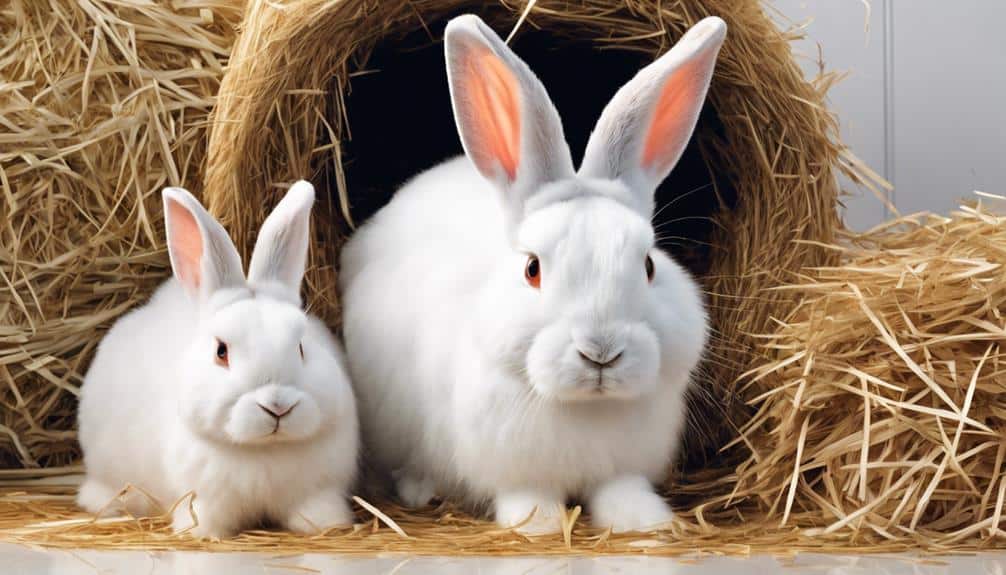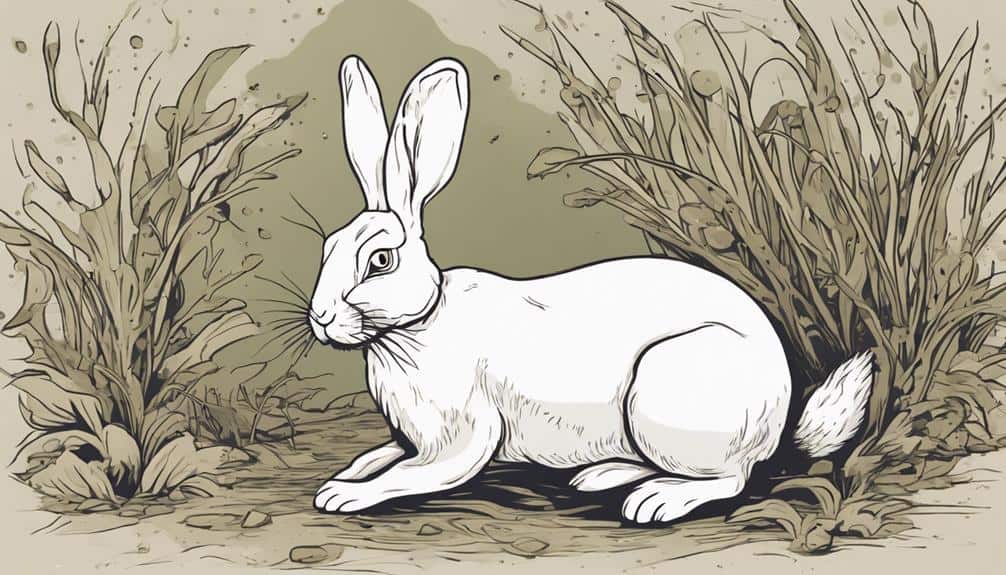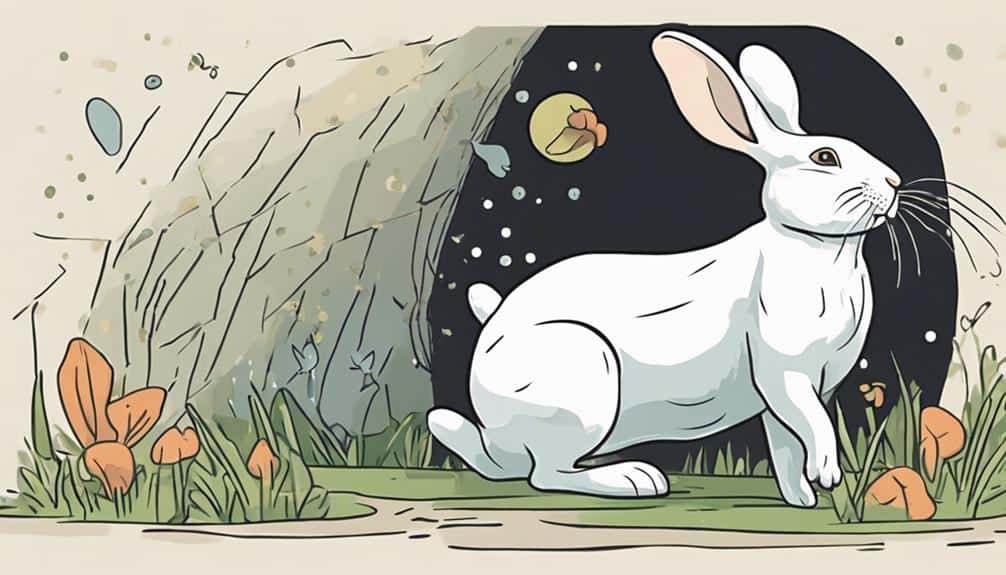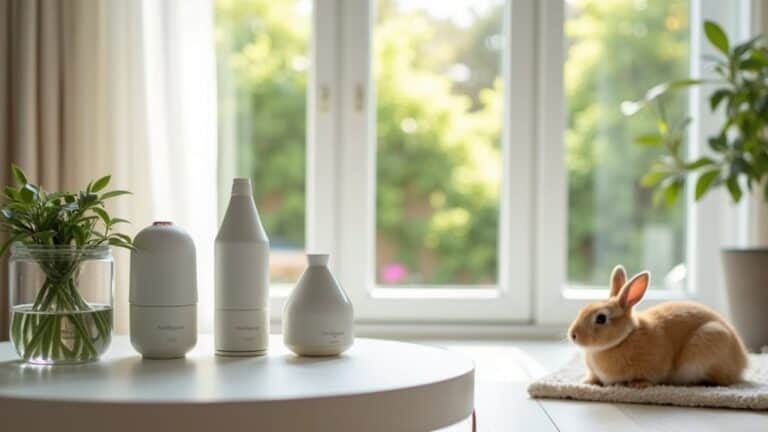When it comes to rabbits, did you know that respiratory issues are one of the most common health concerns they face, with up to 40% of rabbits experiencing respiratory problems at some point in their lives?
Understanding the balance between prevention and treatment is crucial in ensuring the well-being of your furry companions. Whether considering the impact of environmental factors on respiratory health or exploring effective medical interventions, uncovering the best approach can make a significant difference in your rabbit's quality of life.
Contents
- 1 Key Takeaways
- 2 Common Respiratory Problems in Rabbits
- 3 Respiratory Infections in Rabbits
- 4 Signs of Respiratory Issues in Rabbits
- 5 Seeking Veterinary Care for Rabbits
- 6 Treatments for Rabbit Respiratory Problems
- 7 Prognosis for Rabbit Respiratory Conditions
- 8 Preventive Measures for Rabbit Respiratory Health
- 9 Cost Considerations for Rabbit Respiratory Care
- 10 Frequently Asked Questions
- 11 Conclusion
Key Takeaways
- Early detection through regular check-ups is crucial for effective treatment.
- Prevention strategies, like balanced diets and stress-free environments, are vital for respiratory health.
- Prompt veterinary care significantly impacts prognosis and recovery.
- Tailored treatment plans and preventive measures play key roles in managing respiratory issues.
Common Respiratory Problems in Rabbits

Identifying common respiratory problems in rabbits requires a keen understanding of the symptoms and underlying causes associated with these issues. One prevalent issue is upper respiratory infections, with Pasteurellosis being a primary concern among rabbit owners. Pasteurellosis, caused by bacteria like Pasteurella, can lead to a condition commonly known as 'snuffles.' This infection affects the upper respiratory tract of rabbits, causing symptoms such as sneezing, nasal discharge, weight loss, and difficulty breathing. Rabbits are masters at concealing their ailments, underscoring the importance of vigilant monitoring for early detection of respiratory issues.
When dealing with Pasteurellosis in rabbits, prompt diagnosis and treatment are essential. If left untreated, respiratory infections can progress to more severe conditions like pneumonia, posing a significant risk to the rabbit's health. Veterinary intervention, including diagnostic tests like PCR and radiographs, is vital for accurately identifying the specific respiratory problem and implementing effective treatment strategies. By understanding the nuances of upper respiratory issues like Pasteurellosis, rabbit owners can better safeguard the well-being of their furry companions.
Respiratory Infections in Rabbits
Respiratory infections in rabbits, commonly caused by bacteria like Pasteurella and Bordetella, present with symptoms such as sneezing, nasal discharge, fast breathing, and reduced appetite.
When dealing with bacterial infections like snuffles in rabbits, it's important to be aware of the following:
- Prompt Veterinary Attention: If you notice any signs of respiratory distress in your rabbit, seek veterinary care immediately. Respiratory infections can escalate rapidly and become life-threatening if left untreated.
- Isolation and Hygiene: Once a respiratory infection is confirmed, isolate the infected rabbit to prevent the spread of the bacteria to other rabbits. Ensure thorough cleaning of cages and living areas to reduce the bacterial load.
- Strict Medication Adherence: If antibiotics are prescribed for your rabbit's respiratory infection, follow the veterinarian's instructions diligently. Completing the full course of antibiotics is essential to make sure the infection is fully eradicated and prevent antibiotic resistance.
Signs of Respiratory Issues in Rabbits

When observing rabbits for potential respiratory issues, be vigilant for signs such as weepy eyes, nasal discharge, and sneezing. These symptoms can indicate underlying respiratory infections in rabbits.
Additionally, respiratory problems may lead to stained fur from excessive grooming around the eyes and nose, so check for any discoloration. Pay attention to changes in your rabbit's energy levels, appetite, and weight, as these could also be indicators of respiratory issues.
If you notice your rabbit breathing rapidly, wheezing, or, in severe cases, experiencing sudden death, seek veterinary care immediately, as these are signs of serious respiratory infections.
Prompt identification and addressing of respiratory symptoms are essential for effective prevention and treatment in rabbits. By being proactive and observant, you can help guarantee the health and well-being of your rabbit, catching potential respiratory issues early before they escalate into more severe problems.
Seeking Veterinary Care for Rabbits
When it comes to your rabbit's respiratory health, seeking veterinary care is vital. Regular check-ups are essential for early detection of any issues that may arise.
Timely treatment provided by a vet can make a significant difference in your rabbit's recovery and overall well-being.
Importance of Check-Ups
Regular veterinary check-ups are crucial for maintaining the overall respiratory health of your rabbit. These routine visits allow for early detection and prevention of potential issues, ensuring your pet's well-being. Here's why check-ups are vital:
- Early Detection: Veterinarians can identify respiratory diseases in rabbits before they progress.
- Preventive Measures: Routine examinations enable the implementation of preventive care strategies to safeguard your rabbit's respiratory system.
- Professional Guidance: Vets offer valuable advice on proper care, including housing conditions and diet, to reduce the risk of respiratory problems.
Signs Warranting Vet
Seek veterinary care promptly for your rabbit if you observe persistent nasal discharge, labored breathing, lethargy, reduced appetite, or weight loss, as these are signs warranting immediate attention.
Respiratory distress signs like wheezing, coughing, or rapid breathing also require urgent veterinary intervention for pet rabbits.
Changes in behavior such as decreased grooming, hunching, or reluctance to move are red flags that indicate the need for a vet visit regarding respiratory issues.
Additionally, if your rabbit displays symptoms like eye infections, head tilt, or abscesses alongside respiratory problems, seeking veterinary care promptly is important.
Early intervention by a veterinarian is necessary for effectively treating respiratory infections in rabbits and preventing further complications or fatalities.
Timely Treatment Crucial
If your rabbit is showing signs of respiratory distress, taking swift action to seek veterinary care is imperative for ensuring a positive outcome in managing their condition. When dealing with respiratory issues in rabbits, timely treatment is paramount.
Here are three essential steps to contemplate:
- Prompt Veterinary Evaluation: Schedule an appointment immediately if you notice any respiratory symptoms in your rabbit.
- Diagnostic Testing: Your vet may recommend tests to identify the specific respiratory tract infection affecting your rabbit.
- Tailored Treatment Plan: Veterinarians can provide antibiotics, nebulizer treatments, and supportive care tailored to the needs of infected rabbits.
Treatments for Rabbit Respiratory Problems
When treating respiratory problems in rabbits, utilizing antibiotics such as Baytril® is a vital practice to combat infections effectively. Baytril® is a broad-spectrum antibiotic that's often prescribed by veterinarians to treat respiratory infections in rabbits. It works by inhibiting the growth of bacteria, helping the rabbit's immune system fight off the infection. In addition to antibiotics, nebulizer treatments can be beneficial in delivering medication directly to the respiratory system, guaranteeing more targeted and efficient treatment.
Isolating ill rabbits is essential when dealing with respiratory infections to prevent the spread of the disease within a group. This not only protects healthy rabbits but also aids in the recovery of the sick ones. Treatment for respiratory issues in rabbits typically spans over at least two weeks to guarantee full recovery. Proper treatment is essential to avoid potential complications such as pneumonia and relapses in rabbits with respiratory problems. By following these treatment protocols diligently, you can help your rabbits recover fully and prevent further health issues.
Prognosis for Rabbit Respiratory Conditions

How do the severity of infection and treatment response impact the prognosis for rabbit respiratory conditions? When dealing with respiratory issues in pet rabbits, understanding the prognosis is essential for providing appropriate care.
- Response to Treatment: A rabbit's prognosis can greatly improve if they respond well to prescribed treatments such as antibiotics, nebulization, and supportive care.
- Severity of Infection: The prognosis is often more favorable for mild cases of respiratory infections in rabbits compared to severe or advanced infections that can lead to complications.
- Risk of Relapses: Even after apparent recovery, rabbits with respiratory conditions are at risk of relapses, emphasizing the need for continued monitoring and follow-up care.
Preventive Measures for Rabbit Respiratory Health
Maintain a balanced diet high in hay, fresh vegetables, and clean water to support peak respiratory health in your rabbits.
Guarantee a stress-free environment with adequate ventilation and clean living quarters by regularly changing bedding and cleaning cages.
Schedule routine veterinary check-ups to detect any early signs of respiratory issues and promptly address them to prevent the escalation of infections in your rabbits.
Diet for Respiratory Health
To promote ideal respiratory health in rabbits, incorporating high fiber hay, fresh vegetables rich in vitamin C, and limited pellets with high-quality ingredients into their diet is essential. These dietary choices play a critical role in maintaining overall wellness and preventing respiratory issues.
Here are key components for a respiratory-friendly rabbit diet:
- High Fiber Hay: Provides essential fiber for digestion and helps prevent obesity.
- Fresh Vegetables: Such as romaine lettuce and bell peppers, offer vitamin C to support the immune system.
- Limited Pellets: With high-quality ingredients aid in weight management and reduce the risk of respiratory problems.
Environment Impact on Health
Shifting from the discussion on diet for respiratory health, ensuring a clean and well-ventilated environment becomes paramount in preventing respiratory issues in rabbits.
Common causes of respiratory problems in rabbits stem from environmental factors, such as dusty bedding and poor ventilation. To safeguard your rabbit's respiratory health, limit their exposure to dusty materials, and make sure their living space has proper airflow.
Stress-free conditions, along with a well-maintained living area, play a vital role in preventing respiratory infections. Regular cleaning of cages and litter boxes is essential to prevent the accumulation of bacteria that can trigger respiratory issues.
Regular Veterinary Check-Ups
Regular veterinary check-ups are essential for preventing respiratory issues in rabbits. These check-ups facilitate early detection and treatment, enabling vets to assess overall health and provide guidance on maintaining ideal conditions. Preventive measures may include vaccinations, parasite control, and advice on environmental factors. Veterinarians offer personalized recommendations based on breed, age, and specific risk factors. Routine check-ups monitor the effectiveness of preventive measures and adjust strategies as needed to ensure ongoing respiratory health in rabbits.
This proactive approach to healthcare plays a crucial role in keeping rabbits healthy and happy in the long run.
Cost Considerations for Rabbit Respiratory Care
When considering the financial aspects of rabbit respiratory care, it's important to recognize that treatment costs can greatly vary based on the severity of the infection and the necessary interventions. Expenses for treating rabbit respiratory issues may include medications, veterinary consultations, diagnostic tests, and supportive care measures.
Severe cases that require hospitalization and intensive care can result in higher costs compared to managing the condition at home. Additionally, long-term management of respiratory problems may lead to ongoing expenses for medications and follow-up veterinary visits.
It's vital to contact your veterinarian promptly if you notice any signs of respiratory distress in your rabbit to address the issue early on and potentially reduce treatment costs.
To alleviate the financial burden of rabbit respiratory care, considering pet insurance for coverage can help offset some of the expenses associated with the treatment. By being proactive and seeking appropriate care, you can guarantee the well-being of your rabbit while managing the financial implications of respiratory issues.
Frequently Asked Questions
How Do You Prevent Respiratory Infection in Rabbits?
To prevent respiratory infections in rabbits, maintain a clean environment, limit exposure to sick animals, provide a balanced diet, guarantee good ventilation, and consider vaccinations. These steps, along with proper exercise and grooming, can help keep your rabbits healthy.
What Is the Respiratory Medication for Rabbits?
When treating respiratory issues in rabbits, your vet may prescribe antibiotics like Baytril® or doxycycline. Follow dosage instructions precisely to guarantee effectiveness and minimize side effects. Nebulization therapy can deliver medications directly to their lungs for targeted treatment.
What Is the Most Common Cause of Respiratory Disease in Rabbits?
In rabbits, the most common cause of respiratory disease is Pasteurellosis. Preventive measures like proper hygiene and vaccination can help combat this condition. Common triggers include bacterial agents such as P. multocida and Bordetella bronchiseptica.
What Is the Best Preventive Behavior Against Respiratory Infections?
To keep your rabbit's respiratory system healthy, focus on creating a clean living space and providing a balanced diet. Vaccinate as recommended and promote exercise. Prevention is key; prioritize a healthy environment and good care habits.
Conclusion
To summarize, maintaining the respiratory health of your rabbit is vital to their overall well-being. By focusing on preventive measures such as providing a stress-free environment, clean housing, and a healthy diet, you can reduce the risk of respiratory infections.
However, if your rabbit does show signs of respiratory issues, seeking prompt veterinary care and following appropriate treatment protocols are essential for a positive outcome. Remember, prevention is always better than treatment when it comes to your rabbit's respiratory health.






